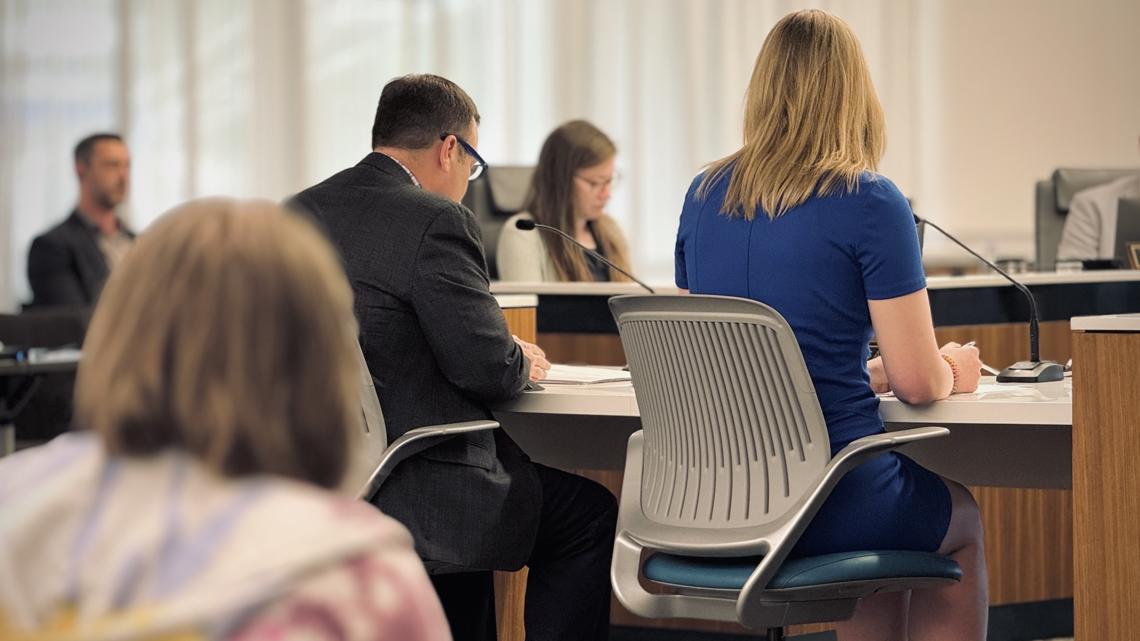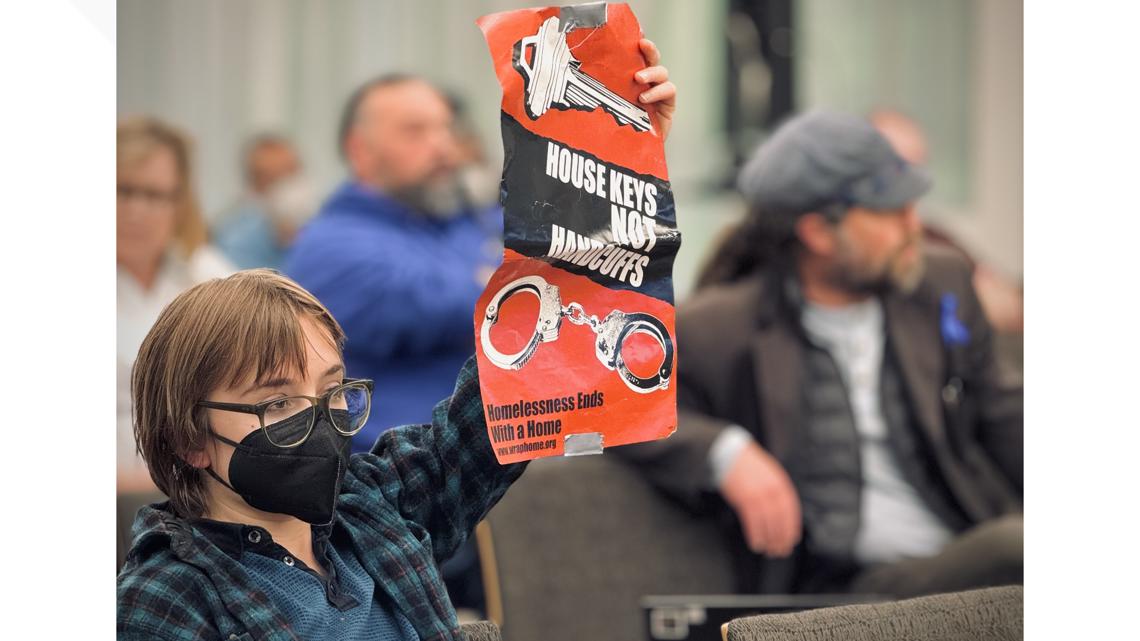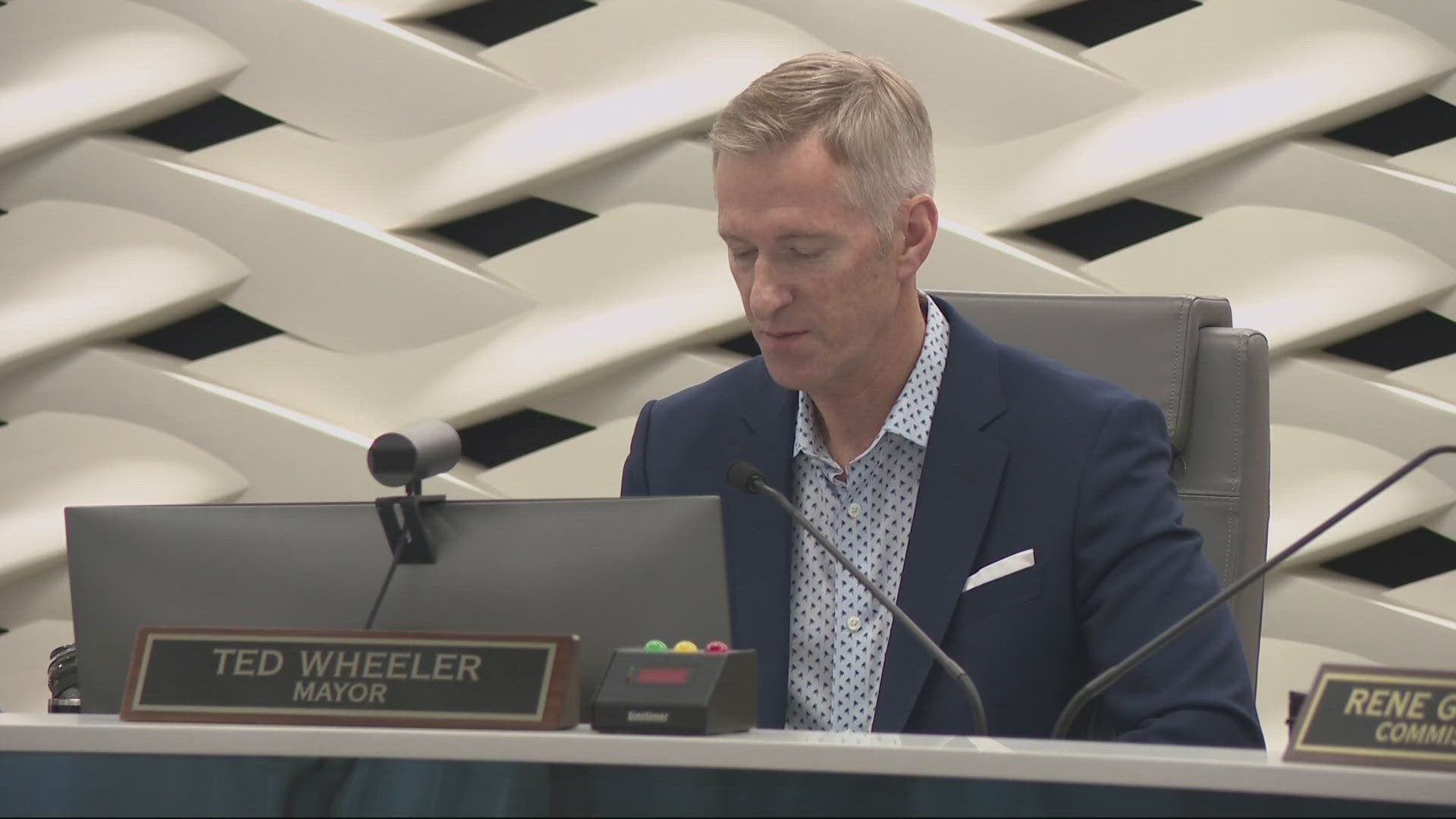PORTLAND, Ore. — Portlanders had their say Wednesday on two competing ordinances that would govern enforcement of homeless camps on city property. The debate happens in front of an uncertain legal backdrop, one that currently keeps the city from enforcing its previously adopted daytime ban on homeless camps.
Mayor Ted Wheeler's proposal is shaped by that legal landscape. While it would theoretically empower the city to arrest people for illegal camping on public property, police couldn't do so unless there was shelter available and the person refused to accept it. It's a more cautious approach that Wheeler's office hopes will be impervious to legal challenge, sticking to the letter of court precedent and state law.
The city would also be able to keep homeless camps off of sidewalks and around the entrances to businesses or other private property, among other restrictions — regardless of whether there is shelter space available.
Under this ordinance, violations would be punishable by $100, up to 7 days in jail or both.
Discussions of that proposed ordinance were originally set to happen last week, but that was upset by Commissioner Rene Gonzalez proposing a suite of amendments that would radically change Wheeler's plan. His counterproposal would initially have hiked penalties for illegal camping significantly, something that he later walked back.
But even with Gonzalez's capitulation on punishment, his plan jettisons Wheeler's caution around legal challenges and hinges almost entirely on a U.S. Supreme Court decision that is both uncertain and unlikely to come down for several months.
Gonzalez would strike Wheeler's idea to punish homeless people only when there is shelter available, instead starting with a baseline of banning camps on all public property that hasn't otherwise been set aside as a shelter.
While that blanket ban on sleeping in public flies in the face of both state law and court precedent, Gonzalez would also give the Portland mayor or a designee the power to change how the city enforces that camping ban at will, depending on the changing tide of laws and court decisions.
Initially, Gonzalez proposed that the mayor's office would be able to change these rules without needing public testimony or approval from the Portland City Council. But in a last-minute change before the afternoon session Wednesday, Gonzalez introduced a third version of his plan that dropped in a "transparency" process requiring a 30-day public comment period.
The Gonzalez proposal would also automatically ban camping if two specific court cases or the existing state law are overturned or repealed. Since his ordinance would already ban camping while empowering the mayor to make their own decisions on enforcement, this might be intended to force the mayor's hand if such a ban became legally actionable.
Under the last-minute third version of Gonzalez's proposal, violations would be punishable by a fine of $1,000 at most, with no possible jail time — a complete about-face from his original proposal, which included lengthy jail sentences.
Debating legality
Mayor Wheeler seemed bemused to learn that Gonzalez had swapped in a new version of his proposal just prior to the afternoon council session — one that the mayor hadn't had a chance to look at.
Over the next hour, much of the discussion centered around the legal ramifications of each plan. While both Wheeler and Gonzalez said they'd consulted with the city attorney's office, Wheeler's proposal was drafted specifically to meet Portland's legal obligations, while Gonzalez acknowledged that the core of his plan was values-driven.
Gonzalez indicated that city code shouldn't try to track state law, and they instead should just set the city code to embody what the Portland City Council wants to see — namely, a complete ban on unsanctioned camping.
"That's the philosophical question that's really at the center of this," Gonzalez said. "We're in a fluid legal environment that I think is going to change as early as this summer ... that's just reality. We thought last year we were adopting something that conformed with House Bill 3115; we may still think it complies with (the law), but we've been stopped from enforcing it."


Gonzalez has said that Portland should adopt a "Gresham model" for its enforcement of homeless camps in order to align the two cities, and his proposal has only gradually evolved to look more like Gresham's in response to feedback from Gresham officials. Gresham, he said, completely bans camping on public property, but is more nuanced in how it enforces that ban — delegating authority to the mayor and employing outreach workers instead of police.
But Wheeler expressed skepticism, with Portland's current camping ordinance already enjoined by the Multnomah County Circuit Court, for passage of a total ban on homeless camps when such a thing would not be in any way enforceable — and about Gonzalez trying to circumvent the city council by handing all authority to the mayor's office.
"Why delegate that authority?" Wheeler asked. "The council ... we're meeting here; we're having this discussion because of an unforeseen circumstance, which is that our first effort at a time, place, manner ordinance was ... enjoined, I guess is the proper word, by a court. So here we are, and we're meeting."
Even if Gonzalez's plan were to pass and all authority on homelessness was delegated to the mayor's office, enforcement changes would need to go through a similar process, Wheeler argued. They just wouldn't have input from other elected leaders.
Testimony
After debate among the commissioners, testimony began from two people who came at Gonzalez's invitation: attorney John DiLorenzo of the law firm Davis Wright Tremaine LLP and Portland Fire Chief Ryan Gillespie.
DiLorenzo represents people with disabilities who sued the city of Portland under the Americans with Disabilities Act over homeless camps blocking sidewalks and ramps. The two sides settled last year, with Portland agreeing to quotas for clearing camps.
In giving his opinion to the council, DiLorenzo said that he preferred Gonzalez's proposal to Wheeler's, saying he thought it would be "more effective."
"I think, assuming that those (who) reside outdoors are likely to choose the path of least resistance, it humanely encourages our unhoused population to settle where the city sanctions camping, the very places where they will have access to services," DiLorenzo said.
Chief Gillespie cited statistics on fires related to homeless people. In 2019, he said, 26% of all fire reports were homeless-related. That rose to 35% in 2023, and so far in 2024, that has gone up to 39%. In 2023, 46% of fire-related injuries and 50% of deaths were among homeless people. Fire injuries have increased slightly this year, while deaths have remained steady.
"The current houseless crisis has weighed heavily on our front-line firefighters for years, as they've increasingly been asked to function as a last line of resort for medical, behavioral, substance abuse and non-emergency calls, as more and more people routinely use 911 to meet basic needs for themselves and others," Gillespie said.
"Given the gravity of the current crisis, Portland Fire & Rescue would support any policy proposals from city council that moves us towards the prohibition of unsanctioned camping and the reduction of associated fire risks that overwhelmingly impact the most vulnerable residents among us," he concluded.
Once public testimony began, an overwhelming number of people spoke against the camping ordinance proposals, and many of them did not differentiate between the plans brought by Wheeler and Gonzalez — pointing to the lack of available shelter or housing and the strain that criminal penalties would put on the already-buckling legal system.


However, there were some comments that attempted to address the plans individually.
"While I might have some concerns about the mayor's plan, Commissioner Gonzalez's alternative seems to be needlessly cruel, more likely unlawful and open to legal challenges, and an affront to the democratic process," testified Amanda Lamb, a civil rights attorney from the Oregon Justice Resource Center. "Contrary to what's been said today, it's the more punitive, restrictive and inflexible plan.
"As an attorney, I intended to come today and point out specific legal concerns with the plan. But about an hour before the meeting, I was notified that the Exhibit A amendments that Commissioner Gonzalez submitted had once again been changed. The latest iteration appears to address some of the most obvious illegalities, but I believe there is still significant vagueness ... and I have significant concerns about consolidating so much power within the mayor's office."
As public testimony came to a close, Commissioner Mingus Mapps appeared to take comments like that one to heart, advising that the city council should wait to vote on amendments until the ordinance's second reading. But Wheeler pushed forward with votes.
Amendments
On top of the competing plans submitted by Wheeler and Gonzalez, two other commissioners submitted possible amendments to the mayor's original plan, both relatively small.
Commissioner Carmen Rubio proposed that the Portland Police Bureau be required to gather data on people arrested under the camping ordinance in order ensure that the rules aren't being enforced disproportionately. Data would include the number of arrests, demographics of the people arrested, and the frequency of arrests. That information would then be made available to the public.
Another proposal from Commissioner Mapps would require that the city form a "Public Environment Executive Team" composed of the mayor, Portland's forthcoming city administrator and deputy city administrators, and any other executive staff named by the mayor. The team would be responsible for programs and services related to homelessness and unsanctioned camping.
"The Public Environment Executive Team shall review policy proposals related to homelessness and unsanctioned public camping," Mapps' amendment reads. "The Public Environment Executive Team will regularly report to the Mayor on legal and policy developments regarding homelessness and unsanctioned camping and shall propose to the Mayor amendments to City Code based on any such developments, which the Mayor at their discretion may choose to introduce for consideration by City Council."
Gonzalez's final plan incorporated versions of both of these proposed amendments, part of an overall shift within the last week to win support from his colleagues on the council.
When the amendments came up for a vote, the Rubio and Mapps components passed easily.
But Gonzalez's alternative camping ordinance, itself composed of several separate amendments, did not make it over the finish line. Gonzalez and Commissioner Dan Ryan voted in favor, but Wheeler, Mapps and Rubio voted against. Wheeler's ordinance, with the Rubio and Mapps amendments now incorporated, will advance to a second reading.

